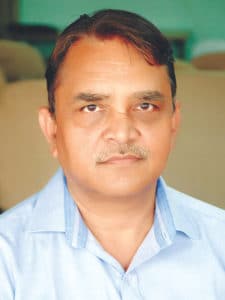
Established in 2006, located in Kota, Rajasthan Technical University (RTU) aims to empower State’s youth with quality technical education, says Prof N P Kaushik, Vice Chancellor, Rajasthan Technical University, in conversation with Ahmad Shariq Khan of Elets News Network (ENN).
Please give a brief description about Rajasthan’s Technical Education Space. What are the major challenges of it and what initiatives have been taken to overcome those?

Rajasthan, the largest State in India (in terms of area), due to its geographical need and available natural resources, has a large scope of expansion of engineering education. At present, three-tier technical education system exists in Rajasthan.
Rajasthan has institutes like IIT Jodhpur, MNIT Jaipur, two state technical universities – RTU and BTU and their 112 affiliated engineering colleges. Apart from this, about 50 private universities in the state are also running engineering courses. Further, the BITS Pilani, Manipal University, JKLU, LMNIT are the examples of private deemed universities currently operational in the State.
The maximum intake capacity of Rajasthan Technical University in engineering courses was 63,000 in 2014-15. The maximum enrolled strength was 29,500 in 2013-14 which is 48.2 percent of actual intake capacity. In 2017-18, the intake capacity reduced and it was about 48,000. The current enrolled strength is 14,663 which is 30.29 percent of actual intake capacity.
The intake capacity (16.32 to 14.76 from 2015-16 to 2017-18) and enrolled strength (8.37 to 7.5 from 2015-16 to 2017-18) at the national level is also decreasing every year and at present, the enrolled strength in engineering courses is only about 50 percent. This shows an overall decreasing trend of intake and enrollment in engineering courses throughout the country. Also, due to the lack of good quality faculty and infrastructure facilities in institutes, lack of learning attitude in students are the constraints in producing good engineers.
The placement of engineering graduates is around 25-30 percent. The quality of placement is also a big question. Further, there is a huge gap between academia and indutry. This gap needs to be bridged by systematic planning to enhance the skills of students and industry institute interaction.
What are the important measures undertaken by RTU for enhancing skilling and employability of youth?
Curriculum revision and the subject content as per the need of industry is one of the key factors in improving technical education. The curriculum as per the model curriculum of the All India Council for Technical Education (AICTE) has been revised and implemented for all engineering courses from session 2018-19 in Rajasthan Technical University (RTU) affiliated colleges. The Induction programme for first year B. Tech students has been made compulsory along with industrial internship of 12 to 24 weeks during the course.
RTU organised its first Hackathon on 22-23 September in line with the AICTE. In the Hackathon, more than 100 teams participated. The students will be tasked to provide solutions to real-life problems from industries within 48 hours. Another such Hackathon is expected to be organised in November.
RTU is also organising the training and orientation programmes for GATE examination in many affiliated colleges. The objective is to motivate students to appear in this exam and also to clear it so that a quality certification is with them when they complete their B Tech programmmes. RTU is also conducting programmes to make its students industry-ready.
With regard to Technical Education, do you think there is a need for more collaborations? Is RTU also joining hands with other global players to enhance technical know-how of students?
Yes, there is a need to collaborate with premier learning institutes and make student or faculty exchange programme effective. It is also necessary to study the best practices of such institutes and implement the same for skill enhancement of students.
With a view to provide opportunities to students for skill enhancement and internship, RTU has made Memorandum of Understandings with CBRI Roorkee, BHU Varanasi, Employer Association of Rajasthan (EAR), CIDC, Engineering Council of India (ECI), Intershala, CADD Centre, CAD Desk and many such organisations. RTU is also exploring opportunities to make MOUs with some international organisations.
What are the steps taken by RTU to bridge the industry-academia gap in the field of technical education?
An engineering graduate must have qualities to make application of fundamentals of science and mathematics in solving engineering problems, ability to identify, formulate and solve problems, ability to interpret and analyse data, skills to use modern tools, softwares, and equipments. Also, they must understand the importance of engineering for society. They must have good leadership qualities, entrepreneurship qualities, self-discipline, integrity and flexibility in behaviour. An engineering graduate should also have good communication skills. Our graduates lack in these qualities. Industries look for graduates who have good technical competence, good core employability qualities and good communication skills. Therefore, there is a big gap between the needs of industries and the graduates. It is possible to bridge this gap by continuous industry-institute interaction, proactive role of industry to come forward and work for betterment of institutes.
To promote soft skill training in institutes, Rajasthan Technical University has introduced human values as compulsory subject, induction programme as mandatory, emphasis on entrepreneurship etc. RTU has also organised many programmes of Industry Institute Interaction in collaboration with EAR, Bhardwaj Foundation, BSDU Colleges, to generate awareness on mutual benefits. RTU has also set up two incubation, innovation and start-up centres at two places in Jaipur to develop an innovative approach among students.
Reach of education to the far-flung areas is still an issue, what plans do you have to tackle it?
The opening of new institutes is in the purview of State Government, university is not involved in this matter directly. However, recently the opening of engineering colleges in remote areas like Barmer, Baran, Karauli and Dholpur are the good initiatives of the Government to reach in far-flung areas. Still, some areas like Churu, Jhunjhnu, Jalore, and Sirohi districts should also be considered. Instead of conducting educational programmes in conventional branches of engineering, courses in the engineering branches as per local needs will be of more help to the students.
The existing divide between rural and urban areas is still a major issue. Please tell us about some of your measures taken to bridge this gap.
One of the important initiatives of AICTE is to introduce Massive Open Online Courses (MOOCs) courses through SWAYAM portal. RTU is also promoting this in affiliated institutes by organising workshops on MOOCs courses. We have also tried to make “SwayamPrabha” channels available in all institutes. With this, we believe, faculty will also be motivated to prepare digital courses and make available for students. Also, the engineering graduates earning 20 credits through MOOCs courses, in addition to minimum credit requirements for passing B Tech programme, will be awarded the B Tech Honours degree.






















